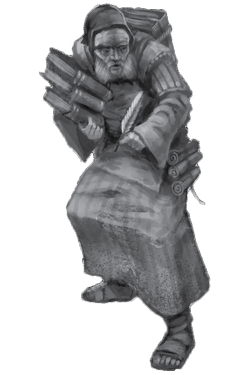m (→Overview) |
No edit summary |
||
| Line 1: | Line 1: | ||
| + | |||
:''“I've never seen writing like this before. It may be a seldom used form of Archaic [[Reikspiel|Imperial]]. Perhaps, I can find a clue in one of my [[book]]s...”'' |
:''“I've never seen writing like this before. It may be a seldom used form of Archaic [[Reikspiel|Imperial]]. Perhaps, I can find a clue in one of my [[book]]s...”'' |
||
::—Anonymous Scribe{{fn|2a}} |
::—Anonymous Scribe{{fn|2a}} |
||
| Line 11: | Line 12: | ||
Translators are expected to accurately translate what’s said to them so the other party can understand the language. Translators may also record certain events, writing down important events and the like. They also help to compose letters, translate letters, and a number of other similar tasks.{{fn|3b}} |
Translators are expected to accurately translate what’s said to them so the other party can understand the language. Translators may also record certain events, writing down important events and the like. They also help to compose letters, translate letters, and a number of other similar tasks.{{fn|3b}} |
||
| + | |||
| + | ==The Scribe's Tithe== |
||
| + | Given the amount of paperwork done in the city of laws, Scribes and their services are in high demand. In order to gain a little extra income, the city of [[Talabheim]] has instituted a tithe that is applied to the services of any merchant that copies, writes, or records information for a client. Additionally, the sale of parchment, paper, ink, sealing wax, and writing implements are also taxed. The less fortunate in Talabheim see the Scribe’s Tithe as a tax on illiteracy, since the poor of Talabheim have always been forced to seek more educated folk to write their letters for them.{{fn|4a}} |
||
==Notable Scribes== |
==Notable Scribes== |
||
| Line 23: | Line 27: | ||
**{{Endn|3a}}: pg. 95 |
**{{Endn|3a}}: pg. 95 |
||
**{{Endn|3b}}: pg. 111 |
**{{Endn|3b}}: pg. 111 |
||
| + | *{{Endn|3}}: ''Warhammer Fantasy Roleplay: Terror in Talabheim'' (2nd Edition) |
||
| + | **{{Endn|3a}}: pg. 11 |
||
[[es:Escriba]] |
[[es:Escriba]] |
||
[[Category:S]] |
[[Category:S]] |
||
Revision as of 15:52, 25 October 2019
- “I've never seen writing like this before. It may be a seldom used form of Archaic Imperial. Perhaps, I can find a clue in one of my books...”
- —Anonymous Scribe[2a]

Scribes and scriveners fill a particular niche in Old World society. As most people don’t read, the Cult of Sigmar prefers the common people to listen and learn rather than read and learn. Scriveners are employed by wizards, scholars, lawyers, and anyone else who needs copies made of texts, scrolls, or books. Illuminators, those scribes with a bit of artistic flair, cloister themselves away, illustrating holy texts with an intricate level of detail.[3a]
Overview
Since most citizens of the Empire are illiterate, Scribes are very much in demand. Virtually every government, civil, military, or religious institution requires a large number of Scribes for record keeping. There are also public Scribes, who make a living writing and reading letters for the illiterate common folk. Scribes are well-educated and many go on to become Scholars or Lawyers. A few tire of reading about the adventures of others and resolve to have some of their own. With their extensive knowledge of other languages, they make excellent translators for foreign expeditions.[1a]
Translators
Most translators begin their careers studying language as Scribes in one of the great cities. Having no lack of work (the literacy rate is quite low), these men and women have not only mastered the art of writing, but have found they could also learn to communicate with many different cultures. Translators may have served as public Scribes, but having little love for the city life, they volunteered their talents for an interesting life in service to a wizard, a great warrior, or even a vain thief whose story demands to be told.[3b]
Translators are expected to accurately translate what’s said to them so the other party can understand the language. Translators may also record certain events, writing down important events and the like. They also help to compose letters, translate letters, and a number of other similar tasks.[3b]
The Scribe's Tithe
Given the amount of paperwork done in the city of laws, Scribes and their services are in high demand. In order to gain a little extra income, the city of Talabheim has instituted a tithe that is applied to the services of any merchant that copies, writes, or records information for a client. Additionally, the sale of parchment, paper, ink, sealing wax, and writing implements are also taxed. The less fortunate in Talabheim see the Scribe’s Tithe as a tax on illiteracy, since the poor of Talabheim have always been forced to seek more educated folk to write their letters for them.[4a]
Notable Scribes
- Anton Hollenberg – Anton is not only a masterful Scribe, but also the inventor of a fabulous device – the pantograph. The pantograph is a mechanical wonder a Scribe wears like a glove. The glove is linked by delicate and cleverly jointed arms to another pen that duplicates the writer's every move. Thus Anton has invented a very crude sort of copying device. Whenever Anton performs his duties as a Scribe, he always uses the pantograph. This ensures he has not only the copy he submits to the client, but also a copy for his own records.[2a]
